‘Games get serious’ at double conference
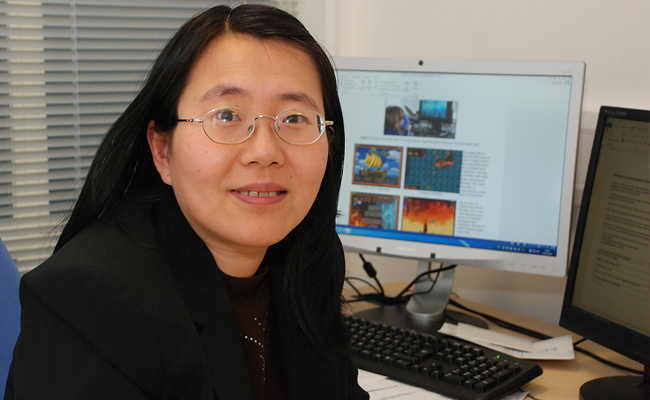 The joint event was chaired and co-organised by Professor Minhua Ma of the School of Art, Design and Architecture.
The joint event was chaired and co-organised by Professor Minhua Ma of the School of Art, Design and Architecture.
Wed, 10 Jun 2015 10:52:00 BST
Global experts show how games are an important aid to healthcare, education, the environment… and even ghost hunting
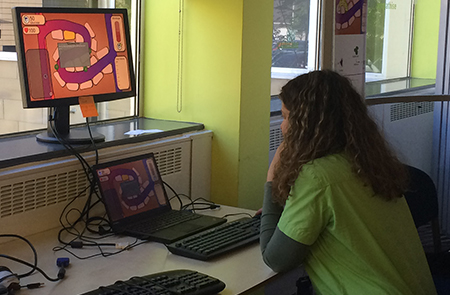 Pictured right: A delegate at the conference plays on one of the 'Serious Games showcased at the event.
Pictured right: A delegate at the conference plays on one of the 'Serious Games showcased at the event.
MANY of the world’s leading experts in the use of video game-based technology to make breakthroughs in fields such as health, education and the environment came to the University of Huddersfield for a two-day event that showcased their research. They learned how ‘serious games’ – as they are termed – can be used as an aid to recovery from illness, as a means of exploring distant parts of the world... and even to hunt ghosts in historic sites.
The event was a joint event of the Sixth International Conference on Serious Games Development and the Fifth GameDays Conference. It was chaired and co-organised by Professor Minhua Ma, a pioneer and leading authority in the field who is a Professor of Digital Media and Games in the University of Huddersfield’s School of Art, Design and Architecture.
On her arrival at the University in 2014, Professor Ma offered it as the venue for the Joint Conference and she is a member of its multi-national team of organisers. The programme committee for the conference had representatives of 17 countries throughout the world.
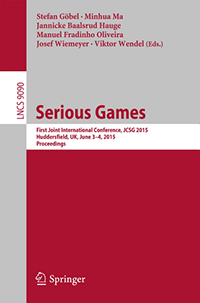 Pictured left: A book has been published containing the proceedings of the Joint International Conference.
Pictured left: A book has been published containing the proceedings of the Joint International Conference.
There were 18 keynote addresses, papers and presentations in a sequence of five themed sessions that covered topics such as games for health, games for learning and game design and development.
Professor Ma said that the first joint conference that combined the two previously-established events proved to be highly successful, with the University of Huddersfield an ideal venue, and that it would now be the pattern for future international gatherings in the serious games field.
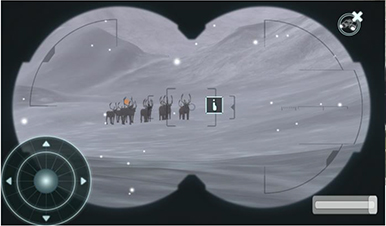 Award-winners
Award-winners
During the sessions, participants in the Joint Conference were able to sample many of the serious games that are under development and which can be played on a variety of electronic media, including tablet computers and smartphones. The assembled experts awarded marks to games that they tried, and the top prize was tied between Michael Christen’s team and Daisy Abbott.
Michael Christen's team of Carnegie Mellon University in the USA, showcased two games named Hello Ocean and Arctic Stars which are designed to enable pupils to make exciting and educational field trips and learn marine biology without leaving the classroom. Pictured right is a screenshot of the game Artic Stars.
Daisy Abbott of the Glasgow School of Art, showcased a non-digital board game that she designed to help postgraduate students plan their research degrees.
Among the highest scoring games was an interactive mobile app named Sur-Face, designed to help patients who are deciding on whether to undergo surgery to correct facial deformities. The app helps patients understand the complexities of the operation and provides 3D visualisations. It is the creation of University of Huddersfield PhD researcher Yeshwanth Pulijala, who is supervised by Professor Ma.
Mads Haahr, of Trinity College Dublin, described his mobile phone-app designed to encourage a new level of engagement with cultural heritage, such as historic sites. It is a location-based “augmented reality” game that draws inspiration from Gothic literature and folk tales. It casts its players as paranormal investigators, using their smartphones as ghost hunting devices. Conference attendees sampled the game – and Mads Haahr arranged for a guest ghost that could be discovered by the players!
The opening keynote address was from Dr Tim Marsh (as seen in the video), of Griffith University, in Brisbane Australia. He described his research into slow gameplay and how it can aid concentration and reflection. He has used this approach to raise awareness of the environmental issues facing Australia’s Great Barrier Reef.
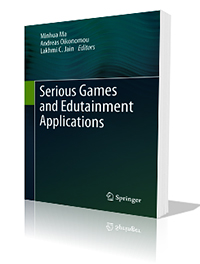 Pictured left: Professor Ma's co-edited book 'Serious Games and Edutainment Applications'.
Pictured left: Professor Ma's co-edited book 'Serious Games and Edutainment Applications'.
The proceedings of the Joint International Conference have been assembled in a volume titled Serious Games published by Springer. The 195-page book contains 12 full papers and five short papers, reviewed and selected from 31 submissions. The book also contains the text of Dr Marsh’s address. The volume was edited by Professor Ma, alongside the international panel of Stefan Göbel, Jannicke Baalsrud Hauge, Manuel Fradinho Oliveira, Josef Wiemeyer and Victor Wendel.
Professor Ma’s 2011 co-edited book Serious Games and Edutainment Applications – which explores opportunities for game developers to apply their knowledge to areas outside of the entertainment industry – has proved to be highly successful and the publisher has now asked for a second edition.







